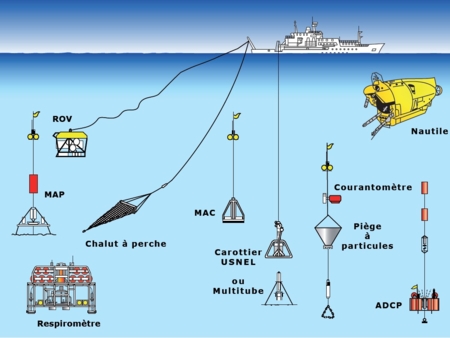Deep-sea hydrothermal vents
A series of studies is being carried out on deep-sea hydrothermal vents. These studies focus mainly on the sulfur and iron cycles. The first part of the research focuses on the study of the microbial metabolism of sulfur disproportionation, from the ecosystem scale to the molecular scale. This microbial metabolism, which is a priori ancient, is the least documented metabolism in the sulfur cycle. It could play a significant role in the sulfur cycle in environments where sulfur compounds in an intermediate oxidation state are abundant.
The aim of our work is to identify the diversity of microorganisms involved in this catabolism, to decipher their metabolic pathways and to analyze the evolution of this metabolism in relation to the other metabolisms of the sulfur cycle. They also aim to study the contribution of sulfur disproportionation to sulfur species fluxes in deep hydrothermal habitats and to study the biogenic transformations (biomineralization, alteration) of minerals induced by sulfur-disproportionators, as well as their mechanisms. The second part of the study focuses on the iron cycle. The aim is to study the structure and functions of the microbial communities involved in the iron cycle at the scale of a hydrothermal field and to study their contribution to the biogenic transformations of minerals (alterations/biomineralizations).
A third aspect of our work concerns the study of certain mechanisms of adaptation to high pressure and high temperature in Thermococcales archaea.
Finally, to carry out this work and answer our questions, we are also developing tools for sampling, experimentation and phenotyping.







